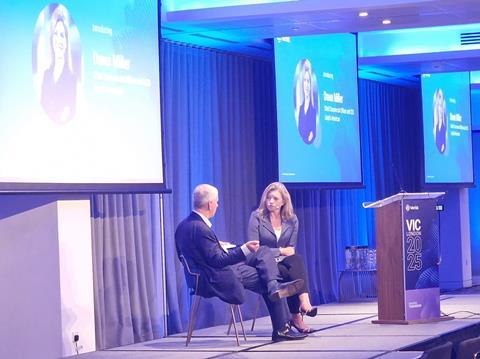Executives from Lloyd’s, Aviva and Verisk used the Verisk Insurance Conference 2025 in London to deliver a shared message: insurance must brace for more volatility, adapt to rapid technological shifts, and adopt common standards to keep pace with the risks facing clients.
Verisk group CEO Lee Shavel set the scene by urging the industry to sharpen its data capabilities and push for more connected markets.

Aviva UK CEO Jason Storah followed with a warning that extreme weather, political interference and softening rates were putting insurers’ bottom-line discipline to the test.
Lloyd’s of London’s chief commercial officer and CEO, Lloyd’s Americas, Dawn Miller (pictured in conversation with Shavel) placed geopolitics, innovation and talent at the heart of her vision for a “future fit” market.
Miller: Geopolitics, data and talent
Miller said Lloyd’s had reviewed “own risk assessments” across managing agents to test whether boardroom concerns match underwriting behaviour on the ground.
“Geopolitics definitely headlined,” she said. “Next level down would have been interconnected risks… while AI is helping us… how is it creating new risks as well?”
She added that modelling gaps remain for perils such as severe convective storm and hail. “Talent is an ongoing and large risk for our business.”
Her prescription began with some fundamentals.
“The baseline… is data,” she said, highlighting the need for scalable routes to market, faster pathways from innovation to capital, and more regulator engagement through sandboxes and knowledge exchange.
She pointed to an increasing number of partnerships, new memoranda of understanding with governments, academics and technology organisations.
Lloyd’s Lab, the re/insurance market’s technology incubator, was, she said, increasingly drawing innovators from beyond the sector.
One applicant had mapped river beds across the world, offering these data for insurance industry use. Such entrants bring “enormous amounts of data” and are driving a 95% success rate of Lab participants staying in the market, she highlighted.
Storah: volatility and discipline
Aviva’s Storah struck a cautious tone on macro forces shaping insurance.
“We’re living in a world where there’s just more volatility,” he said, warning that decisions would be better “led by economics, not led by populist politics.”
On AI, he saw “massive opportunities,” but said risks around fraud and cyber remain acute.
Extreme weather events are now a daily reality, too, he observed
“They are coming, and we’re seeing them all over the world,” Storah said.
He underlined Aviva’s focus on sustainable pricing through market cycles.
“The top line is vanity and the bottom line is sanity,” he said, describing how competitive pricing soft market conditions expose “who’s vain and who’s sane.”
Storah pressed for systemic responses to climate risk, from investment in nature-based flood resilience to embedding property-level resilience standards in housing policy.
He contrasted North America’s rich property data with the UK’s patchier picture, calling for better datasets to prove the downstream value of resilience investment.
Shavel: infrastructure and connection
Opening the session, Shavel positioned Verisk as a connective infrastructure to help insurers navigate the shifting risk landscape.
He stressed better data access, more predictive insights and linking underwriting, claims and capital.
This included work around social unrest and political risk analytics, in addition to natural catastrophe risk modelling, to expand capabilities in strikes, riots and civil commotion.
Shavel also previewed a new property claims carbon calculator, designed to quantify emissions from materials and rebuilding choices.
He argued that resilience will depend on local measures such as enforcement of building codes, alongside a shared quantitative “language” for different forms of risk capital.
“The language of insurance is data and numbers,” he said.
Miller agreed that standards, partnerships and talent would shape the market’s future.
“We cannot move forward unless we have the right diverse talent at the table,” she added.










No comments yet